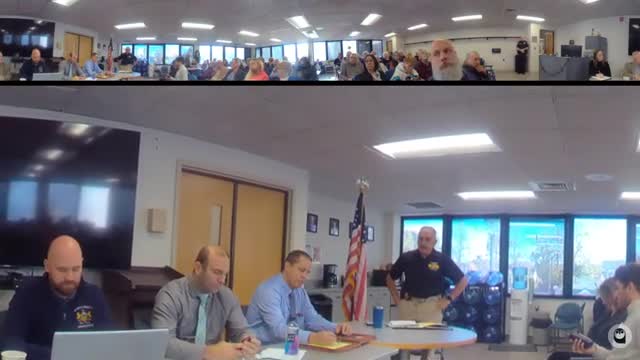Beaver County sheriff seeks 287(g) cooperation with ICE; residents and faith leaders press for safeguards
Get AI-powered insights, summaries, and transcripts
Subscribe
Summary
Beaver County Sheriff Guy asked the Beaver County Board of Commissioners during a Oct. 29 work session to support his office’s participation in a federal 287(g) immigration‑cooperation program that would let trained local deputies check arrestees’ immigration status and hold them for ICE pickup.
Beaver County Sheriff Guy asked the Beaver County Board of Commissioners during a Oct. 29 work session to support his office’s participation in a federal 287(g) immigration‑cooperation program that would allow trained local deputies to query DHS databases, determine immigration status, and, in some cases, place detainers to hold individuals for up to 48 hours for ICE to take custody.
The sheriff said he has submitted a letter of interest and ‘‘a signed agreement with the Department of Homeland Security and ICE’’ and described the administrative steps the program requires, including background checks and initial and periodic refresher training for deputies. ‘‘The plan is to have those deputies trained and authorized by ICE, access the database, and ask questions of those individuals to determine their immigration status,’’ he said, describing the process as centered in the county’s regional booking center where arrestees are fingerprinted and photographed.
The sheriff urged commissioners to support the effort, saying local law enforcement leaders and a Beaver County Chiefs of Police meeting had voted to back his participation and that recent court precedent in Bucks County affirmed a sheriff’s independent authority to enter such agreements. He also said federal reimbursements and grants are available to offset costs and that he did not expect the program to increase the county’s 2026 budget. ‘‘I see no reason to believe that this is gonna cost county taxpayers any additional money,’’ he said.
The sheriff characterized the request as a public‑safety measure. He cited a series of recent incidents described to him by local law‑enforcement partners and said cooperation with ICE would be ‘‘a force multiplier’’ to remove people whom he described as committing serious crimes. He told commissioners he would implement the program primarily through the booking center rather than by deputizing officers to patrol separately for immigration‑related enforcement.
Public comment that followed was lengthy and sharply divided. Several faith leaders and parishioners expressed worry that local cooperation with ICE could erode trust between immigrant communities and law enforcement and could deter crime reporting. Sister Mary Parks of the Saint Joseph leadership team told the board that ‘‘when we weaponize our local law enforcement in this manner, what happens to people’s trust level and calling the authorities when they have a problem?’’ Sister Sandy said she was ‘‘disturbed’’ by reports of aggressive federal tactics and asked for detailed answers about how many deputies would participate and what tactics might be used.
Local advocates and residents asked about training and due process. Joel Dixon of Newswickley Township and the group Stronger Together asked what training deputies would receive ‘‘to ensure that we don't have the kinds of incidents that are happening nationally where those civil rights and due process are being violated?’’ The sheriff responded that deputies would receive DHS‑provided training and said those placed into ICE custody receive due process through federal procedures.
Other commenters raised legal and operational questions: an attorney in the audience, Robert Banks, pressed the sheriff about the distinctions among 287(g)’s participation models (jail enforcement, government‑service, or task‑force models) and about access to detained people by counsel and family; several residents asked for the timeframe behind the crimes the sheriff cited and for evidence supporting claims about numbers or costs.
Commissioners and the sheriff repeatedly emphasized the sheriff’s stated intent to use the county booking system as the primary point of contact with immigration databases rather than to conduct broad enforcement sweeps. A county official noted that a missed Oct. 1 deadline prevented the sheriff’s office from receiving one potential DHS equipment grant, and the sheriff said federal reimbursements might still be available for the work once the program is established.
No formal county vote was taken at the Oct. 29 session. Solicitor Fidelis earlier in the meeting notified commissioners of a litigation matter that would be discussed in executive session. Several speakers asked the board to clarify insurance, training, and supervisory arrangements before the county commits to a model; others submitted written statements either supporting or opposing the sheriff’s approach.
The meeting moved to executive session after public comment and did not reconvene publicly.
